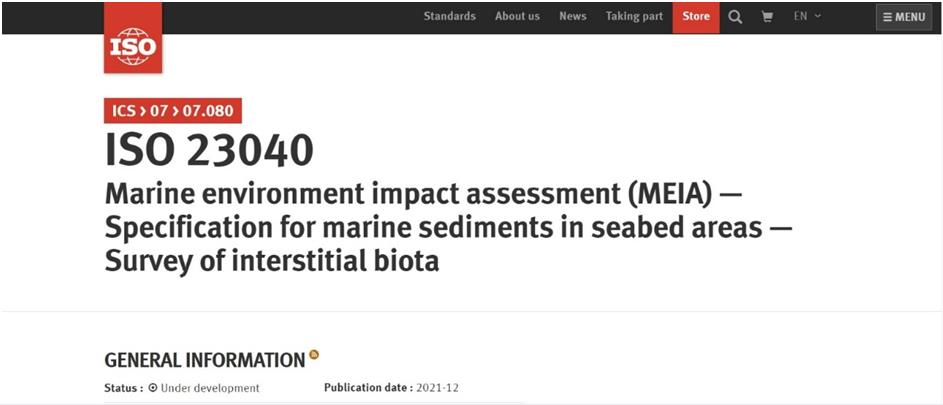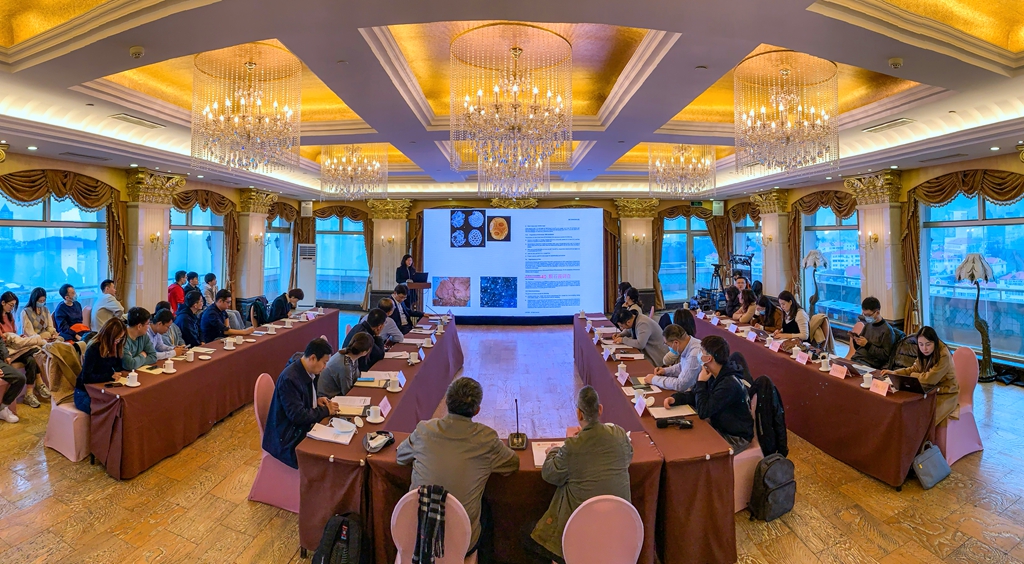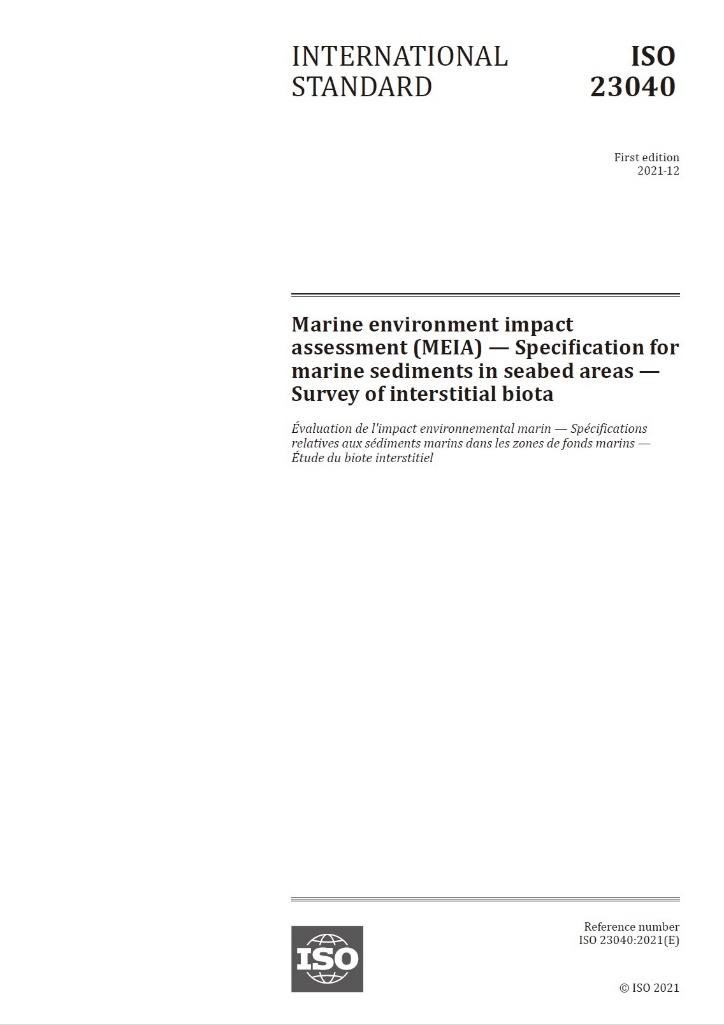The international standard ISO 23040: 2021, “Marine environment impact assessment (MEIA) — Specification for marine sediments in seabed areas — Survey of interstitial biota”, which was jointly proposed by the Institute of Oceanology, Chinese Academy of Sciences and the First Institute of Oceanology, Ministry of Natural Resources, has been officially published and implemented by the International Standard Organization (ISO) on December 10, 2021. It is the first ISO international standard in the field of Marine surveys developed by China and jointly formulated by eight countries, marking an important breakthrough in the internationalization of China's Marine survey technical standards. The project leaders of ISO 23040:2021 are Prof. Yanli Lei and Prof. Tiegang Li.

The international standard ISO 23040 has been officially published and implemented by the International Standard Organization (ISO)
This international standard provides requirements and recommendations for conducting marine surveys of interstitial biota in marine sediments. It includes the specification of technical methods for the investigation of marine sediments, foraminifera, ostracoda, radiolaria, diatoms, coccoliths, sedimentary sporopollen, benthic viruses, benthic microbes (including bacteria, archaea and fungi), benthic microalgae, benthic protozoa and metazoan meiobenthos. This international standard is applicable to marine surveys in diverse benthic habitats at any seabed, such as benthic sediments of coastal zones, shallow seas, or deep-sea waters. This international standard provides relevant technical approaches for the investigation of sediment interstitial biota in seabed areas.
This international standard embodies the recent developments of modern marine science and technology to facilitate international cooperation. It is applicable to investigations and evaluations of marine sediment biodiversity in seabed areas, favoring the development and utilization of marine biological resources, the comprehensive environmental exploration, ecological environment assessment, protection and management, etc. The specifications in this document incorporate technical advances and technological key points, reflecting current state-of-the-art and international practice. The international standards will provide technical support and standard guarantee for multilateral cooperation in the field of Marine survey, build a friendly bridge for international cooperation, and provide a scientific basis for international negotiations and contracting mining activities in seabed areas.
According to the "United Nations Convention on the Law of the Sea" (UNCLOS), the international seabed area refers to the seabed and ocean floor and its subsoil outside the sea area under national jurisdiction, accounting for about 40% of the earth's surface area. In addition, the ongoing negotiation of an international agreement on the conservation and sustainable use of "Biodiversity Beyond National Jurisdiction (BBNJ)" in the seas beyond the scope of national jurisdiction by the United Nations is the most important international legislative process in the marine field. The main topics surrounding the BBNJ, including the area management and environmental impact assessment of international high seas protected areas, require conclusions based on the investigation of sediments and organisms in the seabed area. In addition, many large-scale international comprehensive research programs have been carried out in the seabed area, such as the Ocean Drilling Program (ODP) and the International Ocean Discovery Program (IODP). But so far, due to the lack of international standards, various countries have used different procedures and techniques in the biological survey of seabed sediment gaps, which has created obstacles to data comparison and results calibration in international cooperation. In addition, it also affects the consistency of the scientific assessment of the biodiversity of the seabed area and the environmental assessment resulting from contracting operations.
In 2017, in the absence of an ISO standard in the field of marine surveys, China proposed a New Proposal (NP) for this international standard, which was approved by the ISO project, and received positive responses from relevant countries in the world, such as the United States, the United Kingdom, Russia, Germany, Iran, South Korea, Singapore and Panama appointed experts to participate in the formulation of this international standard. The Working group Draft (WD) was adopted in May 2019, the Committee Draft stage (CD) was adopted at the International Standards Conference in September 2019, and the inquiry Draft International Standard stage (DIS) international ballot was adopted in October 2020. It lasted for four years. ISO 23040: 2021 is officially published and promulgated by ISO.

ISO 23040 International Standards Conference Scene
Chinese expert committee includes the following scientists: Yanli Lei (Institute of Oceanology, Chinese Academy of Sciences), Kuidong Xu (Institute of Oceanology, Chinese Academy of Sciences), Tiegang Li (First Institute of Oceanography, MNR), Zhimin Jian (Tongji University), Fan Wang (Institute of Oceanology, Chinese Academy of Sciences), Chaolun Li (Institute of Oceanology, Chinese Academy of Sciences), Jian Liu (Qingdao Institute of Marine Geology, China Geological Survey), Chunsheng Wang (Second Institute of Oceanography, MNR), Zhuhua Luo (Third Institute of Oceanography, MNR), Muhong Chen (South China Sea Institute of Oceanology, Chinese Academy of Sciences), Xin Su (China University of Geosciences, Beijing) and Baohua Li (Nanjing Institute of Geology and Palaeontology, Chinese Academy of Sciences) . The Project leader is Yanli Lei. The Chinese expert committee leaders are Tiegang Li and Zhimin Jian, and the Management leader is Fan Wang.
This international standard project was supported by the following foundations: National Key Research and Development Program: Post-cruise Scientific Research of International Ocean Drilling Expeditions to the South China Sea, (Grant No. 2018YFE0202401); Major project of National Natural Science Foundation of China (Grant No.42090040); the Strategic Priority Research Program of the Chinese Academy of Sciences (Grant No. XDB42000000).

ISO 23040: 2021, “Marine environment impact assessment (MEIA) — Specification for marine sediments in seabed areas — Survey of interstitial biota”
Standard link: https://www.iso.org/standard/74374.html#:~:text=ISO%2FDIS%2023040%20Marine%20environment%20impact%20assessment%20%2
(Editor: ZHANG Yiyi)

